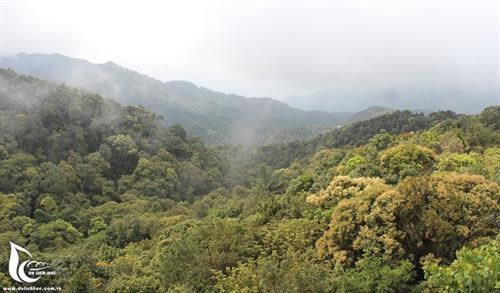
 |
| Bach Ma National Park is one of the biggest and most important protected areas in Vietnam (Photo: baothuathienhue.vn) |
The park covers nearly 37,500ha across nine communes and two towns in Thua Thien-Hue province’s Phu Loc and Nam Dong districts, as well as Da Nang city’s Hoa Vang district.
With a favourable geographic location and mounting to heights of 1,000-1,440m, it has a stable temperature (16-22 degrees Celsius) and humidity all year round with annual rainfall averaging 3.4-4m.
Home to 16,900ha of primeval forests, it harbours 1,406 species of flora, including many rare types like cho chi (parashorea chinensis), kien (hopea pierrei hance), and go (afzelia xylocarpa). More than 300 precious herbal plants have been found here such as ba gac (rauvolfia verticillata), binh voi (stephania glabra miers), and la khoi (ardisia silvestris).
Bach Ma National Park is also home to 931 species of fauna – including 83 rare mammal species such as bear, leopard, tiger, and sao la (Pseudoryx nghetinhensis); 333 bird species; 31 reptile species; 21 frog species; 39 fish species; and 218 butterfly species.
Upon visiting the park, tourists will have a chance to explore nature trails such as the Tri Sao Trail that leads to Tri Sao Waterfall, whose vicinity is home to many tri sao birds (rheinardia ocellata), and the Ngu Ho (Five Lakes) Trail that leads to a group of interconnected lakes.
Moving along the Vong Hai Dai (Sea Watch Tower) Trail, visitors will reach an observation tower on Mount Bach Ma, and from here they can have gain a view of the scenic Hai Van Pass, Mount Tuy Van, Cau Hai Lagoon, Tu Hien Estuary, Chan May Port, as well as the cities of Hue and Da Nang.
In 1932, French colonialists built a resort area in Bach Ma that included 139 villas, a market, a bank, a post office, a swimming pool, a tennis court, and a 19km-long road system linking the centre of Bach Ma with what is now National Highway 1A.
Those villas have been renovated for tourism purposes and now bear such names as Do Quyen, Sao La, and Kim Giao.
To improve the management, conservation, and utilisation of the park’s values and to attract investment in eco-tourism services, the People’s Committee of Thua Thien-Hue is outlining key areas for developing eco-tourism area within the park.
Vice Chairman of the committee Nguyen Van Phuong described Bach Ma National Park as a “sleeping beauty”, with unique eco-tourism potential and advantages. Authorities are also working to assess possible environmental impact so as to develop tourism in the most sustainable manner.
(Source:VNA)





![[Photo series] Admiring the most beautiful riverside road in Dong Nai before its technical traffic opening](/file/e7837c02876411cd0187645a2551379f/012026/nen_20260114174655.jpg?width=500&height=-&type=resize)